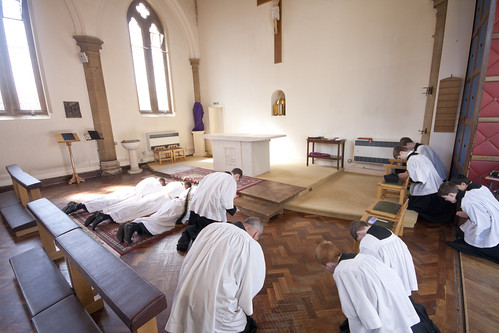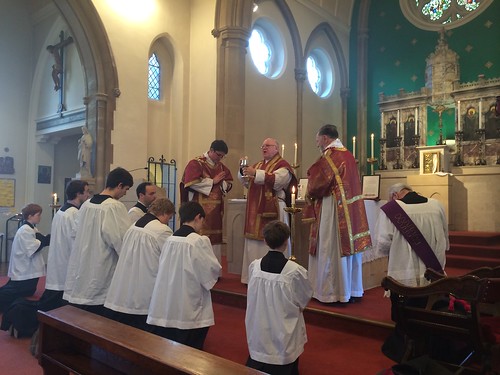 |
| Good Friday Liturgy with the FSSP, Reading |
Part 1
Part 2
Part 3
-----------------------------------------------------
In my last post, I suggested that what may be necessary in dealing with the crimes of our predecessors in the Church are two things: compensating the victims, and repudiating any ideological justification put forward for the crimes. My examples were anti-Semitism and paedophilia.
My discussion of past crimes has, deliberately, focused on issues where the crimes clearly really did take place, and clearly are crimes. I don't want to give the impression that I want to accept every accusation against Catholics as true: that will lead to injustice just as surely as treating every accusation as false. Nor am I, by any means, inclined to say that everything which has been done by Catholics down the centuries which does not meet the approval of modern liberals is a crime. Again, the hysteria surrounding the investigation of the recent past in Ireland shows that a lack of historical perspective, and extrapolation from insufficient information, can distort the picture to the extent that good people end up being depicted as monsters. Let us hope that the apology issued by the Associated Press news service over their own reporting of the Tuam excavations represents the high-water mark of this lunacy.
Plenty of crimes, however, are real enough; there is really no need to gild the lily. Looking at the child abuse scandal, for example, it is increasingly clear that it was a problem which affected a lot of institutions at a particular period of time, but that does absolutely nothing to excuse its presence in the Church. The seriousness with which this plague infected the Church is mind-boggling, and one may be excused for asking: what can possibly wash this from us?
I don't say: what will compensate the victims, or stop it happening again, or satisfy the courts, or even restore the Church's reputation. All these things are important, where possible, but there is also something deeper. These abominable crimes stick to the whole institution, they stick to us as Catholics, not because we are personally guilty but because they have, as it were, defiled the sanctuary. We hear some of the victims say: I can't bear to go into a church building, I can't abide being near a man dressed as a priest. It is not difficult to understand that. We need to purify the Temple as the Machabees purified it after the Abomination of Desolation.
The first thing I want to mention is shame. Shame, unlike guilt, is not necessarily personal; you can have family or national shame, as the converse of family or national pride. When appropriately directed, it is a good thing: any appropriate emotion is good. It is appropriate to feel ashamed of the Church in its human aspect, without losing sight of her divine aspect. The Church as a divine institution cannot be defiled, it is the Body of Christ and ceaselessly offers up to the Father the perfect Sacrifice. But it is human aspect it can be shameful, and the vituperation of a Savoranola or a Dante, directed even towards the holders of her highest offices, is sometimes justified. Whether they would have found the words to address the current crisis I do not know. But we should feel ashamed.
 The cartoon I reproduce here from Private Eye (first published in 2010) is grossly offensive. It represents, nevertheless, something true: the shamefulness of the Church, as seen from the outside. It is not accurate: it is, after all, a cartoon. What I want to say about it is that it should make us ashamed that such a joke could be made about the Church, with some degree of justification.
The cartoon I reproduce here from Private Eye (first published in 2010) is grossly offensive. It represents, nevertheless, something true: the shamefulness of the Church, as seen from the outside. It is not accurate: it is, after all, a cartoon. What I want to say about it is that it should make us ashamed that such a joke could be made about the Church, with some degree of justification. The Duke, disguised as a friar, confronts the pregnant Juliet in Measure for Measure about her repentance for the sin which led to her condition:
'Tis meet so, daughter: but lest you do repent,She replies:
As that the sin hath brought you to this shame,
Which sorrow is always towards ourselves, not heaven,
Showing we would not spare heaven as we love it,
But as we stand in fear,--
I do repent me, as it is an evil,When we contemplate this shame, we should not feel sorry for ourselves - poor us, having to feel shame! - but embrace the shame as the correct response to an objective evil. The shame is a gift. It is the beginning, if we take it in the right way, of reparation.
And take the shame with joy.
And this is the second thing: reparation. We cannot repent on behalf of others, but we can make reparation on behalf of others. We must make reparation for crimes closely associated with the Church, such as those by Catholics, or crimes of sacrilege. We can also make reparation for the crimes of society as a whole.
This is something which too many Catholics have forgotten, but it is something which is of the utmost importance. Without the language and the practice of reparation we have nothing to say, and nothing to do, to deal with the horror of systematic crimes by Catholics, of which paedophilia is the most obvious recent example, or the overwhelming crimes of society, such as abortion. We must make reparation. Reparation, voluntary penance or other good works offered in acknowledgement of some sin, is a participation in the expiation of the sins of whole world by Christ. By participating in this way we apply that perfect expiation in the most urgent way to the most urgent matters of our day. Christ's sacrifice is not incomplete in itself, but it is incomplete as it applies to us and to our society, otherwise sin would be no more. It is that completeness of application which we can advance by our actions, just as it is the glory of God on earth, in men's hearts, not His infinite glory in heaven, which can be increased by our actions.
 |
| High Mass for the Ember Saturday of Lent, Our Lady of Caversham |
Support the work of the LMS by becoming an 'Anniversary Supporter'.
Great post.
ReplyDeleteIt is interesting that the concept of reparation is directly related to sacrifice, and that of course both have been obscured, if not lost, in the new Rite of Mass.
I am much reminded of Romano Amerio's magnus opus Iota Unam, especially where he points out the intellectual malaise, that the actions of liturgical reform reinforced intellectual positions and perceptions of those who carried it out, promote it or use it.
While I whole heartedly agree, penance, especially public penance instituted by the Hierarchy is absolutely required in these times, I am highly sceptical that those in the Hierarchy believe, understand and will, in the same manner as you or I. The real battle is to get them to change the way they believe.
Today there is all too much planned ambiguity - http://bit.ly/1rvrb3X
With respect,
CatholicScout.
Very good post. Thank you.
ReplyDeleteInteresting post as always.
ReplyDeleteSomething that I am not entirely sure about though is the idea of feeling ashamed for sins of others. I do not see why we should feel ashamed about what someone else has done. Perhaps there is a hint of presumption on our part to some degree as well in lifting ourselves above them.
From another perspective, is there no risk of mentally forming some aversion toward the Catholic faith if one associates or develops some shame as a result of the Catholicity of the individual?
The other reason why I have some doubts is with respect to where this shame should originate from. In the case of national shame or family shame you mentioned, the shame comes from the fact that we could not as a nation/family prevent the member (who were in our charge) from committing a certain act. The shame in that case is reasonable.
But I fail to see how the actions of a priest suddenly fell within the responsibility of fellow Catholics. I can see the Pope or Bishops being ashamed about their own failure to prevent such things. I can also see parents of children being ashamed for being too trusting of their children with strangers. But I don't see how one can reasonably feel ashamed about all Catholics.
Is that even healthy?
But I very much agree with the rest of the suggestions of making reparation through penances and other means.
You are confusing shame with guilt.
DeleteIf it can be appropriate to have a positive feeling about, saying, having five martyrs among one's ancestors, then it must be appropriate to have a negative feeling about having five mass-murderers among one's ancestors. Guilt would not be appropriate. We call the appropriate feeling shame.
Shame may call for action. Again, if it is right that we benefit from the good things our predecessors in an institution have done, then we, the current stewards of an institution, should take a degree of responsibility for the bad things. Obviously, there are limits. But this follows for example for the Rosminians and other orders in dealing with historic child abuse cases.